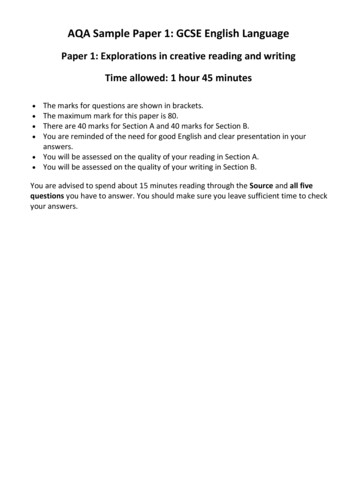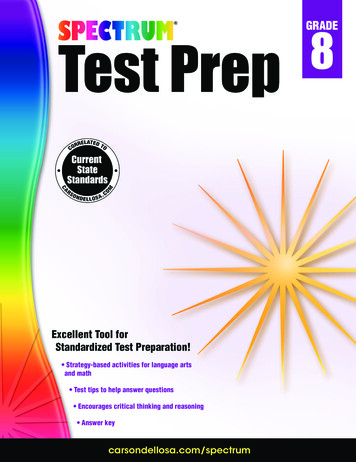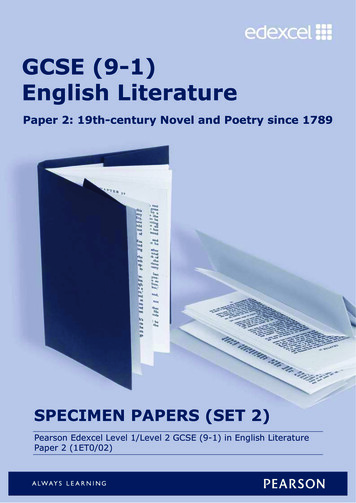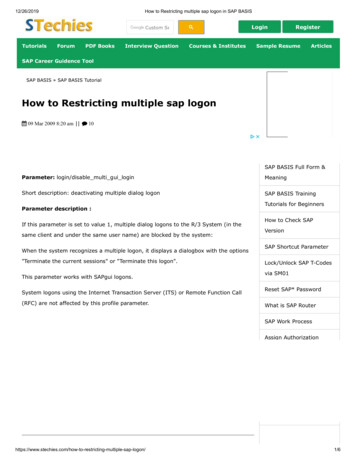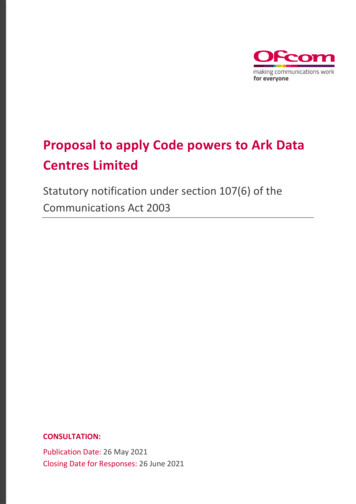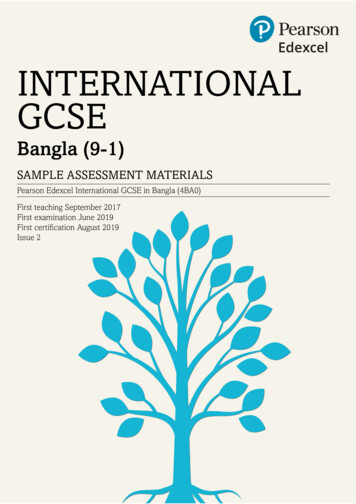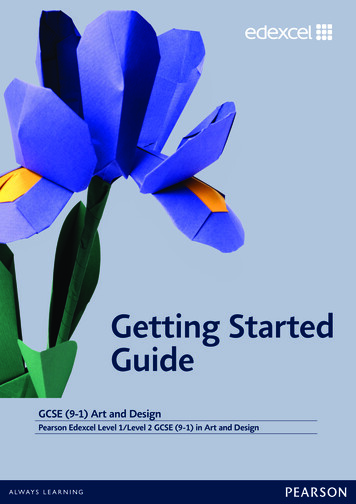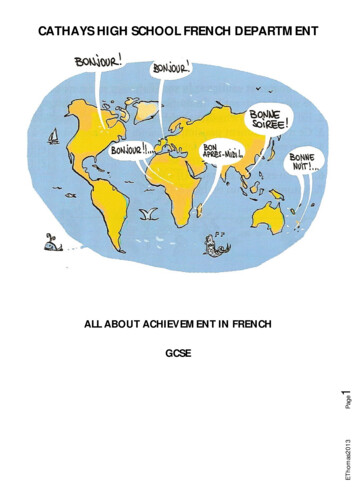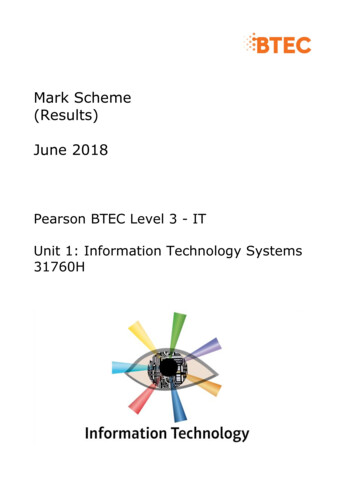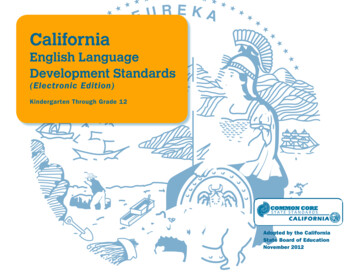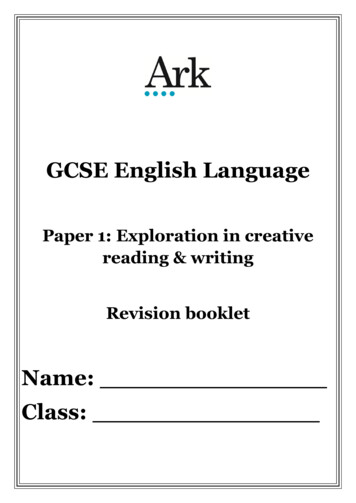
Transcription
GCSE English LanguagePaper 1: Exploration in creativereading & writingRevision bookletName:Class:
ContentsThis booklet will provide students with an opportunity to read and revise unseen fiction for GCSEEnglish Language Paper 1. Activities cover all assessment objectives and looks to develop thenecessary skills to answer all the questions on the paper successfully.Text & Skill1. Do Not Say We Have Nothing by Madeleine ThienAOReading 21st C FictionPage3AO14AO25AO262. Do Not Say We Have Nothing by Madeleine Thien Comprehension questions3. Exploring language in Do Not Say We Have Nothing byMadeleine Thien4. Exploring structure in Do Not Say We Have Nothing byMadeleine Thien5. Evaluation of Do Not Say We Have Nothing byMadeleine Thien6. Using imagery to create meaning in writingAO47AO5 & AO697. Writing a narrative: A Memorable WeekendAO5 & AO610Reading 21st C Fiction13AO115AO216AO2188. All The Light We Cannot See by Anthony Doerr9. All The Light We Cannot See by Anthony Doerr Comprehension questions10. Exploring language in All The Light We Cannot See byAnthony Doerr11. Exploring structure in All The Light We Cannot See byAnthony Doerr12. Evaluating All The Light We Cannot See by AnthonyDoerr13. Using sensory imagery to create meaning in writingAO419AO5 & AO62014. Writing narrative/ description: The Great EscapeAO5 & AO62115. The Unlikely Pilgrimage of Harold Fry by Rachel JoyceReading 21st C Fiction2416. The Unlikely Pilgrimage of Harold Fry by Rachel Joyce– comprehension questions17. Exploring structure in The Unlikely Pilgrimage ofHarold Fry by Rachel Joyce18. Creating engaging openings in writingAO125AO226AO5 & AO62719. Writing a narrative: The UnexpectedAO5 & AO628Reading 20th C Fiction3121. Poison by Roald Dahl – comprehension questionsAO13222. Exploring writer’s methods in Poison by Roald DahlAO23323. Evaluating Poison by Roald DahlAO43424. Varying sentence structure to create meaning in writingAO5 & AO63525. Writing a narrative/ descriptionAO5 & AO63620. Poison by Roald Dahl26. Knowledge organiser for Language Paper 1392
1. Read through the text below and then answer the questions that follow.Do Not Say We Have Nothing by Madeleine ThienThis is the opening chapter to the novel. In this section the narrator, Marie, tells us about herfather and his death. Although written in 2016, the novel begins in 1989 – the same year inwhich hundreds of Chinese citizens were killed for protesting in Tiananmen Square, Beijing.In a single year, my father left us twice. The first time, to end his marriage, and the second,when he took his own life. That year, 1989, my mother flew to Hong Kong and laid my father torest in a cemetery near the Chinese border. Afterwards, distraught, she rushed home toVancouver where I had been alone. I was ten years old.Here is what I remember:My father has a handsome, ageless face; he is a kind but melancholy man. He wears glassesthat have no frames and the lenses give the impression of hovering just before him, the thinnestof curtains. His eyes, dark brown, are guarded and unsure; he is only 39 years old. My father’sname was Jiang Kai and he was born in a small village outside of Changsha. Later on, when Ilearned my father had been a renowned concert pianist in China, I thought of the way hisfingers tapped the kitchen table, how they pattered across countertops and along my mother’ssoft arms all the way to her fingertips, driving her crazy and me into fits of glee. He gave me myChinese name, Jiang Li-ling, and my English one, Marie Jiang. When he died, I was only a child,and the few memories I possessed, however fractional, however inaccurate, were all I had ofhim. I’ve never let them go.In my twenties, in the difficult years after both my parents had passed away, I gave my lifewholeheartedly to numbers – observation, conjecture, logic and proof, the tools wemathematicians have not only to interpret, but simply to describe the world. For the last decadeI have been a professor at Simon Fraser University in Canada. Numbers have allowed me tomove between the unimaginably large and the magnificently small; to live an existence awayfrom my parents, their affairs and unrequited dreams and, I used to think, my own.Some years ago, in 2010, while walking in Vancouver’s Chinatown, I passed a store sellingDVDs. I remember that it was pouring rain and the sidewalks were empty. Concert music rangfrom two enormous speakers outside the shop. I knew the music, Bach’s Sonata for Piano andViolin No. 4, and I was drawn towards it as keenly as if someone were pulling me by the hand.Dizzy, I leaned against the glass.And suddenly I was in the car with my father. I heard rain splashing up over the tires and myfather, humming. He was so alive, so beloved, that the incomprehensibility of his suicide grievedme all over again. By then, my father had been dead for two decades, and such a pure memoryof him had never come back to me. I was thirty-one years old.3
a) Find the definitions of these words and write it down in the space njecture:unrequited:b) Use each word in a sentence of your own to show you understand what the wordmeans.i.ii.iii.iv.v.c) What is the extract about? Summarise it in one sentence.d) What is the atmosphere of the text? Explain this in one sentence.e) List four things you learn about the narrator’s father in this extract:1.2.3.4.f) How do you think the narrator feels about her father leaving? Try to support youranswer with reference to the extract.4
3. Now read the extract again and answer the questions around it.a) What does this phrase make you think about theHereis whatI remember:narrator'smemories?Why?My father has a handsome, agelessface; he is a kind but melancholy man.He wears glasses that have no framesand the lenses give the impression ofhovering just before him, the thinnestof curtains.b) What does this metaphor suggest about the narrator's father? Why?Hiseyes,dodarkbrown,are guardedc)Whattheseadjectivechoices suggest about thenarrator'sfather?Why?39 years old.and unsure;he is onlyMy father’s name was Jiang Kaiand he was born in a small villageoutside of Changsha. Later on,when I learned my father had beena renowned concert pianist inChina, I thought of the way hisfingers tapped the kitchen table,how they pattered acrosscountertops and along my mother’sd)Whatthiswayparttoofherthe description suggest aboutsoftarmsdoesall thethenarrator'sfather?you? einto fits of glee. He gave me myChinese name, Jiang Li-ling, andmy English one, Marie Jiang. Whenhe died, I was only a child, and thefew memories I possessed, howeverfractional, however inaccurate,were all I had of him. I’ve never letthem go.?5
4. Let’s explore how Madeleine Thein has structured the opening chapter to the novel‘Do Not Say We Have Nothing’.a) The novel begins with the following sentence: “In a single year, my father left us twice.”Do you think this is a powerful opening sentence? Why, or why not?b) Look again at lines 13-15, ‘. the few memories I possessed, however fractional, howeverinaccurate, were all I had of him. I’ve never let them go.’In this paragraph, the writer moves between past and present tense. Why do you think the writerchooses to mix the tenses here? What effect does this have? Why?c) Look again at lines 16-21. Earlier parts of the extract have moved backwards and forwards in time,but this section is chronological (meaning that events are described in the order they happened).What effect does this have? What does it make you think about the narrator?d) Look again at lines 22 to the end. What is the effect of this sudden movement from the presentreality into memory? Which phrase in the extract shows that the narrator’s feeling of ‘being in thecar with my father’ is a memory? Why?e) The writer uses a cyclical structure here, linking the end of the extract to the beginning byreferring again to her father’s suicide, and to her age. What effect does this have? Why?6
5. Evaluation of Do Not Say We Have Nothing by Madeleine ThienFocus this part of your answer on the second part of the Source, from line 19 to the end.A student, having read this section of the text, said: “The writer describes the narrator and her grief veryvividly. It makes you sympathise with the narrator.”To what extent do you agree?In your response, you could: write about your own impressions of the narratorevaluate how the writer creates these impressionssupport your opinions with references to the text.[20 marks]Yes / No because :Quotation from the text which supportsthis:7
8
6. Using imagery to create meaning in writinga) Rewrite the following descriptions using either a simile, metaphor or personification. You shouldthink of what meaning you’d like to create for the reader before you rewrite the sentences.E.g. My father is a brave man. – My father is lion-hearted.i.My father is a brave man.ii.The old man looks wise.iii.The sun is shining brightly.iv.A cool breeze is in the air.v.The place is bustling.vi.She can hear happy laughter.vii.Clouds are gathering above.viii.I take the speed train daily.ix.Write your own image of a memory you have of someone.x.Write your own image of a memory you have of something or someplace significant.Extension: Rewrite one of your examples and play around with the mood and effect thatyou want to create to make the description more vivid.9
7. Writing a narrative: A Memorable WeekendAn online competition for story writing is being held, and you have decided to enter.Write a story with the title ‘A Memorable Weekend’. You must think of the effect and meaning you want to create for the reader first.You could use the imagery from the previous activity if it is appropriate to your effect you want tocreate.You could use similar vocabulary, images and structure as the first extract you have read if it fits withthe effect you want to create.You must use correct capitalisation and punctuation.Planning for writingThe big picture outline:Paragraph 1 ‘Setting’Paragraph 2 ‘Someone’Paragraph 5 ‘Conclusion’Paragraph 3‘Something’Paragraph 4 ‘Solution’10
11
12
8. Read through the text below and then answer the questions that follow.All The Light We Cannot See by Anthony DoerrThis extract is from the beginning of a novel by Anthony Doerr. It is set in France in 1944. In this extract,English and American forces are preparing to bomb the French city of Saint-Malo, which has beencaptured by German forces. They begin by dropping leaflets which warn French citizens to leave so thatthey are not hurt. Marie-Laure, a young French girl, is blind and cannot read these warnings.LeafletsAt dusk they pour from the sky. They blow across the ramparts, turn cartwheels over rooftops,flutter into the ravines between houses. Entire streets swirl with them, flashing white againstthe cobbles. Urgent message to the inhabitants of this town, they say. Depart immediately toopen country.The tide climbs. The moon hangs small and yellow and gibbous. On the rooftops of beachfronthotels to the east, and in the gardens behind them, a half-dozen American artillery units dropincendiary rounds into the mouths of mortars.BombersThey cross the channel at midnight. There are twelve and they are named for songs: Stardustand Stormy Weather and In the Mood and Pistol-Packin’ Mama. The sea glides along far below,spattered with the countless chevrons of whitecaps. Soon enough, the navigators can discernthe low moonlit lumps of islands ranged along the horizons.France.Intercoms crackle. Deliberately, almost lazily, the bombers shed altitude. Threads of red lightascend from anti-air emplacements up and down the coast. Dark, ruined ships appear,scuttled or destroyed, one with its bow shorn away, a second flickering as it burns. On anoutermost island, panicked sheep run zigzagging between rocks.Inside each airplane, a bombardier peers through an aiming window and counts to twenty.Four five six seven. To the bombardiers, the walled city on its granite headland, drawing evercloser, looks like an unholy tooth, something black and dangerous, a final abscess to be lancedaway.The GirlIn a corner of the city, inside a tall, narrow house at Number 4 rue Vauborel, on the sixth andhighest floor, a sightless sixteen-year-old named Marie-Laure LeBlanc kneels over a low tablecovered entirely with a model. The model is a miniature of the city she kneels within, andcontains scale replicas of the hundreds of houses and shops and hotels within its walls. There’sthe cathedral with its perforated spire, and the bulky old Château de Saint-Malo, and rowafter row of seaside mansions studded with chimneys. A slender wooden jetty arcs out from abeach called the Plage du Môle; a delicate, reticulated atrium vaults over the seafoodmarket; minute benches, the smallest no larger than apple seeds, dot the tiny public squares.13
Marie-Laure runs her fingertips along the centimeter-wide parapet crowning the ramparts,drawing an uneven star shape around the entire model. She finds the opening atop the wallswhere four ceremonial cannons point to sea. “Bastion de la Hollande,” she whispers, and herfingers walk down a little staircase. “Rue des Cordiers. Rue Jacques Cartier.”In a corner of the room stand two galvanised buckets filled to the rim with water. Fill themup, her great-uncle has taught her, whenever you can. The bathtub on the third floor too. Whoknows when the water will go out again.Her fingers travel back to the cathedral spire. South to the Gate of Dinan. All evening she hasbeen marching her fingers around the model, waiting for her great-uncle Etienne, who ownsthis house, who went out the previous night while she slept, and who has not returned.And now it is night again, another revolution of the clock, and the whole block is quiet, and shecannot sleep.She can hear the bombers when they are three miles away. A mounting static. The hum inside aseashel
All The Light We Cannot See by Anthony Doerr Reading 21st C Fiction 13 9. . that have no frames and the lenses give the impression of hovering just before him, the thinnest of curtains. His eyes, dark brown, are guarded and unsure; he is only 39 years old. My father’s name was Jiang Kai and he was born in a small village outside of Changsha. Later on, when I learned my father had been a .
